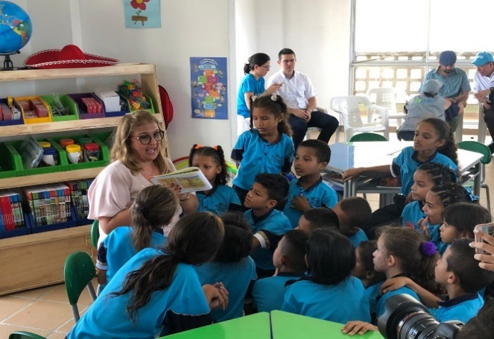About 4.5 million people have emigrated from Venezuela because of high crime rates and shortages of basic essentials such as food and medicine. Of these, 3.7 million live in neighbouring countries.
Colombia is home to 1.5 million Venezuelans, 513,000 of whom are children. The many extra children present in the country have severely strained the school system in Colombia in several areas. Without support, most Venezuelan migrant children cannot attend school.
UNICEF is striving to create educational systems for many of the migrant children so that they can attend local schools, become integrated into society and create opportunities for their future lives – opportunities they would not otherwise have had. One place in which UNICEF is present is Barranquilla, in northern Colombia near the border with Venezuela. The Novo Nordisk Foundation has awarded UNICEF Denmark DKK 1 million for the project.
“Our goal and success criteria are that the children are able to enter the formal school system, stay there and do not drop out but rather complete their education. We know that this is key to a better life. We are therefore offering a transitional package that will enable children and their families to receive both education and support to meet psychosocial needs,” says Karen Hækkerup, Secretary-General, UNICEF Denmark.
Learning circles will integrate children into the formal school system
In the Learning Circles project, UNICEF creates learning systems for migrant children 7–13 years old. After these children participate in the Learning Circles project, UNICEF will help the children to transition to formal education.
“We collaborate with the government, local communities and schools. We also help to educate teachers and early-childhood educators so that they are equipped to support these migrant children. They need to know what these children are coming from so that they can tackle the issues they face and ensure they are ready for school,” says Karen Hækkerup.
Children catch up to their peers through intensive teaching
The grant from the Foundation will enable UNICEF to establish about 20 Learning Circles in Barranquilla. Each Learning Circle will support the education of 15 children, with the involvement of relevant teachers, early-childhood educators and teaching material.
Each Learning Circle is also affiliated with a school, so that the students follow the same teaching framework as in the schools and follow the same lesson plans. With only 15 children per teacher, the teaching process is intentionally intensive and individually organized, so that students have the opportunity to catch up with their peers.
In parallel, the parents will be trained in how to support their children’s education. Part of the grant is allocated to identifying the children who are not part of the established education system.
Each Learning Circle lasts for about a year, after which the children transition to the formal school system.
The grant to UNICEF Denmark is one of 11 grants the Foundation recently awarded for humanitarian efforts and emergency relief in disaster areas. Read more here.
New call for applications
The Foundation has opened a new call for applicartions for humanitarian initiatives and emergency aid in disaster areas. The deadline for applying is March 20. Read more here.
Further information
Christian Mostrup, Senior Press Officer, [email protected], +45 3067 4805








